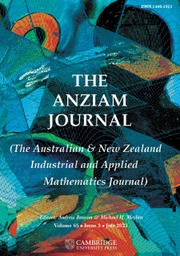Crossref Citations
This article has been cited by the following publications. This list is generated based on data provided by Crossref.
Jennings, L. S.
Wong, K. H.
and
Teo, K. L.
1996.
Optimal control computation to account for eccentric movement.
The Journal of the Australian Mathematical Society. Series B. Applied Mathematics,
Vol. 38,
Issue. 2,
p.
182.
Craven, B. D.
and
Luu, D. V.
1998.
Lagrangian conditions for a nonsmooth vector-valued minimax.
Journal of the Australian Mathematical Society. Series A. Pure Mathematics and Statistics,
Vol. 65,
Issue. 2,
p.
163.
D. Craven, Bruce
and
M. N. Islam, Sardar
2014.
Dynamic optimization models in finance: Some extensions to the framework, models, and computation.
Journal of Industrial & Management Optimization,
Vol. 10,
Issue. 4,
p.
1129.

